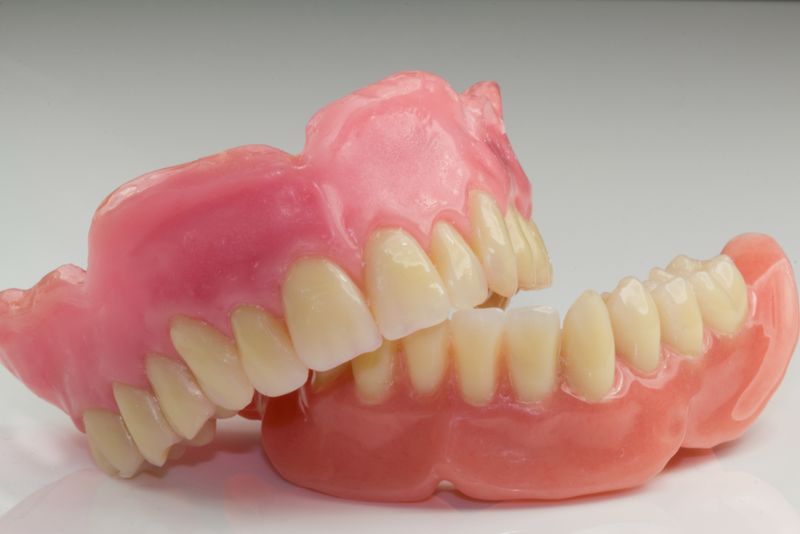When you’re fitted for a set of dentures, you’re not just investing in your oral health — you’re investing in yourself and a return of your self-confidence. A person’s smile is often the first facial feature that other people notice. After years of shyness about showing your teeth, the ability to confidently smile again will be a welcome change of pace.
However, there are a few other changes that come with wearing dentures that may take some getting used to. And one of those things has to do with how you taste food.
Why do dentures affect your sense of taste?
Of course, the tongue is the primary organ that is associated with how you perceive the taste of food and beverages. Lined with thousands and thousands of taste buds, the tongue, upon eating something, sends signals to the brain to indicate how a drink, snack or meal tastes, be it salty, tangy, bitter or spicy. But the tongue isn’t the only part of the mouth involved in flavour profiling. The hard palate also plays a supporting role. Although it doesn’t have quite as many taste buds, the hard palate — which is the roof of the mouth — is lined with taste buds called gustatory cells. So when you bite into an apple, piece of bread or a slice of watermelon, the receptors on the gustatory cells complement the signals that the tongue sends to the brain.
When you’re wearing dentures, the centerpiece that holds all of your teeth together winds up covering your hard palate. As a result, you may notice that foods don’t quite taste the same as they did prior to getting fitted for a set. Dentures won’t prevent you from tasting what you eat and drink — given the entire mouth plays a supporting role when it comes to food and drink consumption — but the flavours may not be quite as pronounced as they were previously.
 The degree to which you taste foods may be different when you first begin using dentures.
The degree to which you taste foods may be different when you first begin using dentures.That’s the bad news. The good news is this side effect of denture wearing isn’t permanent. As you’re undoubtedly aware, the body is remarkably resilient. Whether it’s during intense physical exercise or ascending to higher elevations, it takes the body some time to acclimate to the circumstances of the moment. The mouth goes through a similar process regarding changes. In the first couple of weeks of wearing your dentures, food and beverages with bold flavour profiles may not be quite as pronounced. But with time, the other members of the mouth and overall digestive system will play more of a leading role in supplementary taste sensation. Aside from the tongue, this includes the soft palate (which lies at the very back of the mouth, beyond the reach of dentures), upper esophagus, the epiglottis and even the cheeks, the inner sides of which also contain taste buds. You’ll also grow more accustomed to eating with your dentures in terms of overall comfort, efficiency and what chewing strategies best correlate with added taste perception.
Here are a few tips to be mindful of to make the eating process with dentures as seamless as possible:
Clean your dentures twice daily
Just like you would with natural teeth, it’s important to brush and floss dentures at least twice a day to maintain their overall health. But it’s also important for tasting food. Failing to sweep away food particles not only can lead to premature decay of your dentures, but it can alter flavour profiles, making foods taste strange or unpleasant.
Chew all over
Try to get into the habit of chewing your food as much as possible and on all sides of the mouth. This can help to flex the flavour sensation muscles of the other members of the mouth and digestive system. You may also want to stick to foods early on that are easy to chew, so you may want to avoid foods like meat or lettuce initially. Work your way up to that.
Ensure the dentures fit well
How dentures fit may feel differently depending on what you’re doing. If they shift a lot while you’re chewing, this could wind up adversely affecting your sense of taste, especially if you have to use additional adhesive to make up the difference. Thus, make sure to speak to your dentist about fit. They may be able to make some simple adjustments to resolve this issue.
Opt for implants
You may be a candidate for dental implants. Unlike dentures, which are removable, implants are physically installed into your mouth by attaching to the jawbone with a titanium rod. While dental implants involve a more invasive procedure than dentures, implants eliminate the taste sensation issue by keeping the roof of the mouth fully exposed.
City Dentists specialises in dentistry that is customised to fit your needs — in more ways than one. From cosmetic dentistry to preventive treatments, we’re a full-service oral care provider that more Kiwis prefer. Contact us today to learn more.
